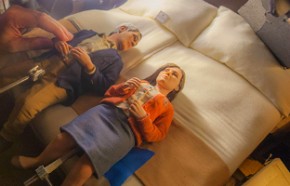Real intimacy

Three of the films nominated for an Oscar—Anomalisa, 45 Years, and Carol—are poignant meditations on intimacy and a person’s agency in falling and staying in love. All three exhibit a breathtaking emotional restraint that makes them unusual in Hollywood.
Anomalisa is a stop-action animation film that uses doll-sized puppets; the film is shot frame by frame by repositioning the puppets. The puppets are just unreal enough to illuminate something very real about human embodiment. The awkward sex scene between two puppets, for example, made me squirm with recognition. Oh God, I thought, that’s what two human bodies must look like engaged in that kind of sex. The scene both moved me and grossed me out—not a bad antidote to glossy Hollywood sex. Director Charlie Kaufman rightly points out that this type of animation “communicates fragility and humanity and brokenness.”
Anomalisa is about the longing to connect to another human being and the things that stand in the way. Michael (voiced by David Thewlis) is seeking a perfect woman who will save him from the soul-crushing sameness of his life. But when he meets Lisa (voiced by Jennifer Jason Leigh), the “anomaly” of the title, Michael cannot see her for who she is and is too selfish to establish a connection even though he craves it. The film is a meditation on the difficulty of relating to another person and letting that person into one’s life.





